YWCA-Federation 21 Day Challenge
YWCA-Federation 21 Day Challenge

|
|
|


|
|
|


A continuing conversation…with Dr. Herb Caron and Dr. Julian Ross THIS Sunday evening, August 2nd – 7:30 p.m. As we continue exploring the roots of antisemitism, Dr. Caron and Dr. Ross will revisit the Gospels and consider how the texts reflect a specific mindset and intention in the historical context of Second Temple and post-Second Temple times. Join Zoom Meetinghttps://zoom.us/j/98045032612?pwd=eWpWSFdsSVY5ZDN5L2h0REkxaFQ0Zz09 Meeting ID: 980 4503 2612Passcode: 583002 Dial in – 646-876-9923 Meeting ID: 980 4503 2612Passcode: 583002
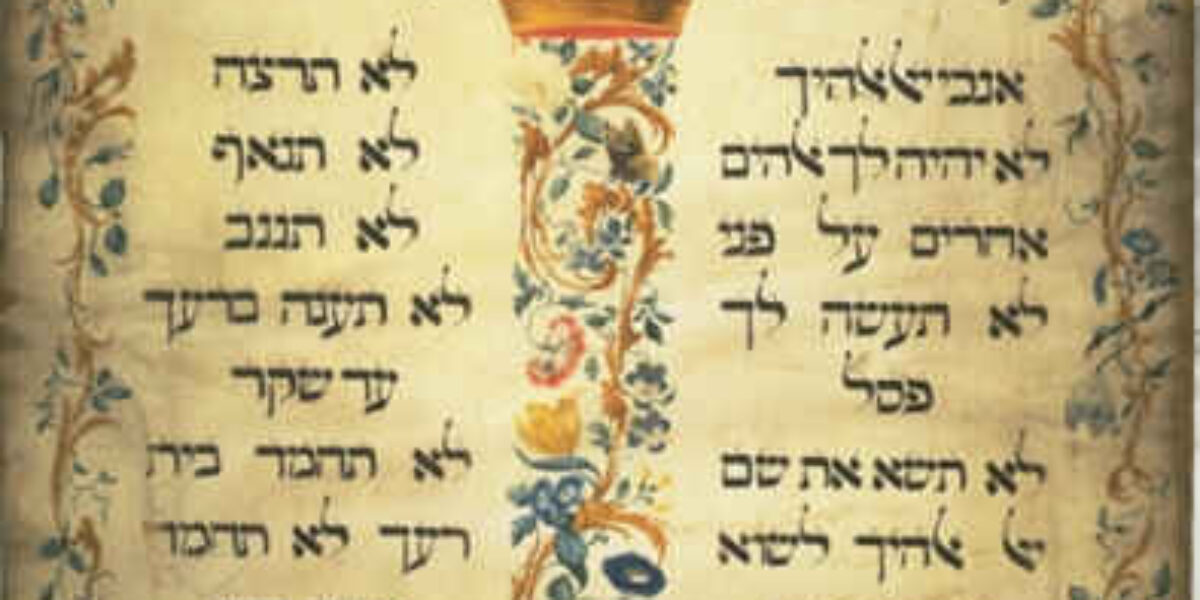
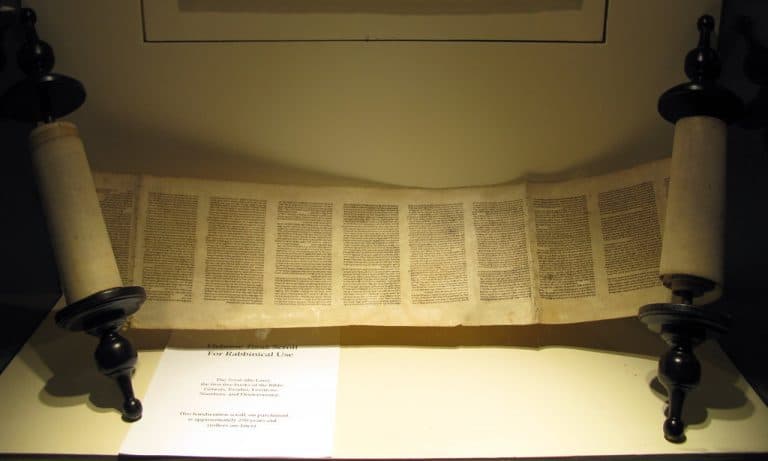
Our Torah portion this week is Va’Etchanan – Deut. 3:23-7:11. Some years ago I got to study with Alex Israel, and I wanted to share his comments on this Torah portion with you: People have been known to criticize Judaism for being too legal, too “letter of the law” and not enough ethics, values and “spirit of the law”. In this regard, Nachmanides (Ramban) makes a monumental remark on this week’s Torah portion. He is commenting on the following verse:
“Be sure to keep the commandments, decrees, and laws that the Lord your God has enjoined upon you. Do what is right and good in the sight of the Lord” (Deut. 6:17-18)
This verse begs the question. Once one is doing the “commandments, decrees, and laws” of God, why add that one should “do what is right and good”? What additional observance could be indicated here? Thirteenth century Spanish Torah scholar Nachmanides (known as Ramban) answers:
From the beginning God said to keep God’s commandments, decrees, and laws as God has commanded them. And now, it says: even regarding what God did not command, pay attention to do what is good and right in God’s eyes, because God loves goodness and righteousness. … it is impossible for the Torah to list every detail of human conduct; interaction with neighbors and friends, the totality of business dealings, and societal and national laws. The Torah having legislated specific laws, such as: “Do not gossip” (Lev. 19:16); “Do not take vengeance or bear a grudge” (Lev. 19:18); “Do not stand idly by the blood of your neighbor” (Lev. 19:16); “Do not insult the deaf” ( Lev. 19:14); “Rise before the aged” (Lev. 19:32), etc., now makes a general statement which applies to the entire gamut of human behavior, the Torah repeats this idea that one should do what is “right and good” … acting beyond the strict demands of the law.”

Ramban is saying that the Torah leaves some of the ethics to our personal intuition and conscience. After legislating specific laws, like the Ten Commandments which are in this Torah portion, it understands that there are legal and ethical loopholes. In any situation, if a person thinks that something feels wrong, even if the law allows it, the Torah says: “Do what is right and good” — act ethically and listen to your conscience!
Have you ever had a feeling that something is just wrong, immoral even, and decided not to do it, not because of the law, but because of an inner feeling?
Ramban invests our moral intuition with seriousness and power; these are our conscience, our guilt-feelings. Our ethical instincts are a divine voice within ourselves.
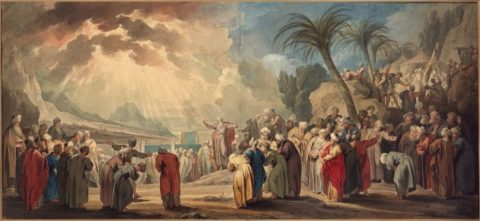
As Moses begins his grand oration… he recalls that he could not lead them without help.
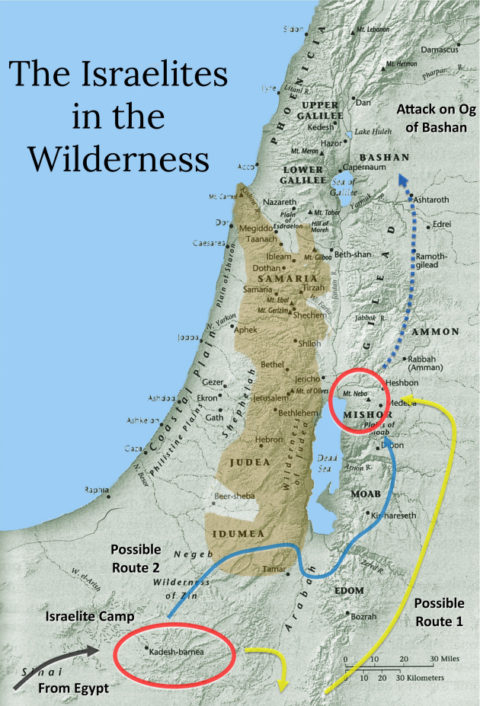
Moses recalls the wanderings — and all the stops along the way over the past forty years

How do Torah portions get their names? Jewish tradition names our Torah portions from the first distinctive word in the…

Our Torah portion this week is Shelach Lecha – Num. 13:1-15:41. Moses sends a group of leaders – one from…
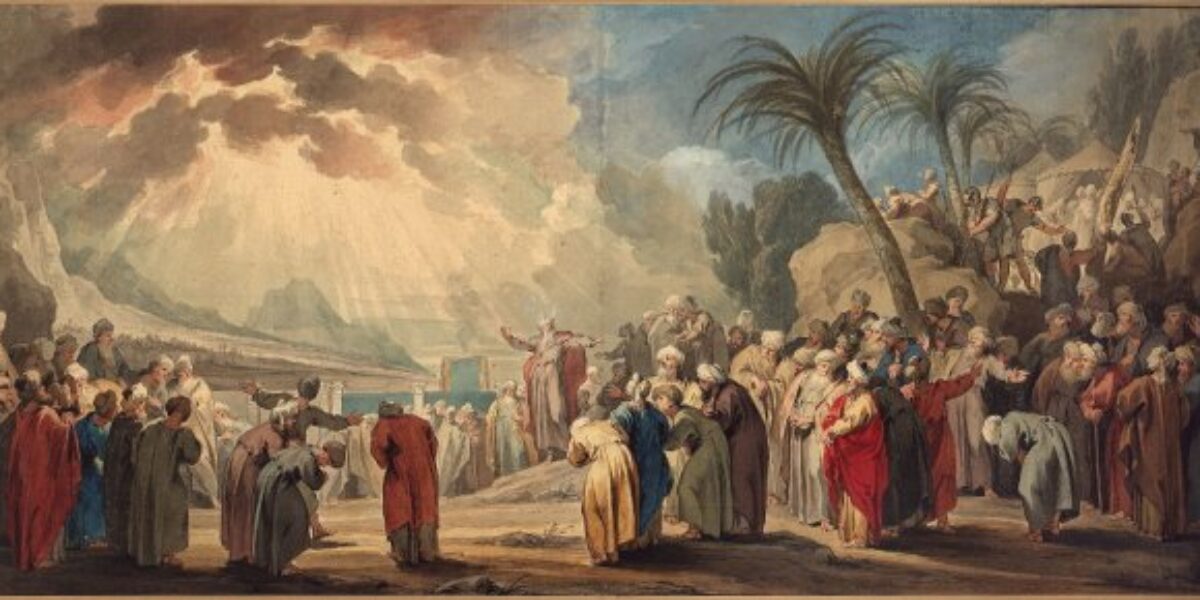

This Shabbat our scroll turns to the concluding book of Torah – Devarim – Deuteronomy, as we read the first portion: Deut. 1:1-3:22. This is also the Shabbat before Tisha B’Av [the ninth of the month of Av, commemorating the destruction of the Temples] – beginning next Wednesday evening, July 29th. As it happens, Deuteronomy 1:12 begins with the word “eichah“ – the Hebrew name for the book of Lamentations, which is read on Tisha b’Av. In fact, the tradition on this Shabbat is for the Torah reader to depart from the musical cantillation we normally chant, and to sing that one verse in the special melody for Lamentations. Hearing that verse chanted in the melancholic melody of the Eichah trope is especially moving. http://www.virtualcantor.com/tbav.htm As Moses begins his grand oration that recounts the Israelites’ travels as they now stand ready to enter the Promised Land, he recalls that he could not lead them without help. Verse 1:12 reads: “Eichah – How – can I bear unaided the trouble you cause, the burden and the bickering?” Its plaintive nature evokes the rhetorical nature of the question; there truly is no answer to “Eichah – How?” It is a moan, and a cry of despair, which matches the opening of the book of Lamentations: “Eicha – Alas! Lonely sits the city once great with people! She that was great among nations is become like a widow; the princess among states is become a thrall.” (Lam. 1:1) The word “eichah” occurs only 18 times in the entire Bible. In each instance, it conveys this despair. But the same Hebrew letters, vocalized differently, appear one other place, in the book of Genesis (3:9). After Adam and Eve eat the fruit of the tree of knowledge, God asks them, “Ayekah,” which is translated as, “Where are you?” The traditional explanation for this question is not that God is asking the location of the first humans. Rather, God is asking them, “Where are you morally? Have you grown, have you learned anything?” In his commentary, Rabbi James R. Michaels posits that our sages have traditionally looked at the rhetorical question “eichah – how?” and read it with the very real question “ayekah – where are you?” in mind. Yes, we mourn for the tragedies of our people and feel anguish at the calamities that dot our peoples’ history. But… Where are we? And, even more importantly… What have we learned from that history? To ask the first question and not attempt to answer the second would move us nowhere.
Moses bemoaned the overwhelming nature of his leadership responsibilities – “eichah – How can I do this?”, and then moved forward by appointing people from the tribes – “wise, insightful, and seasoned.” (1:13) Adam and Eve knew that God’s question to them – “Ayeka?” was not about their location in the Garden, but about their realization that they had not followed God’s instructions to them; Adam blamed Eve, Eve blamed the serpent… and there were consequences… as, to this day, we seek to return to a time of Eden once again. Jeremiah, to whom the book of Lamentations is attributed, reflected the people’s misery and sadness at the destruction of their beloved city – Jerusalem, the center of service – the Temple, and homeland – in their relocation to Babylonia… as the word “eichah” is used 36 times. “Eicha! Alas! How could this happen?” The prophet Isaiah (in this week’s haftarah) will answer that question and provide the evaluation and mid-course correction: “Your hands are stained with crime… Cease to do evil; learn to do good. Devote yourselves to justice; aid the wronged. Uphold the rights of the orphan; defend the cause of the widow…” (Isaiah 1: 16, 17) May we have the ability to recognize the difficulties of our situations. And may we then have the wisdom to reflect on how best to navigate mid-course corrections to help us move forward towards Eden once again. [See Judy Chicago’s Merger Poem: https://ritualwell.org/ritual/merger-poem]

Moses recalls the wanderings — and all the stops along the way over the past forty years

How do Torah portions get their names? Jewish tradition names our Torah portions from the first distinctive word in the…

Our Torah portion this week is Shelach Lecha – Num. 13:1-15:41. Moses sends a group of leaders – one from…

Our Torah portion this week is Naso – Num. 4:21-7:89, and contains the laws of the Nazarite. A Nazarite was…

All school Zoom Tefillah with Rabbi Lader – Sunday, July 26 at 11:00 amUse the following Zoom link Join Zoom Meetinghttps://us02web.zoom.us/j/81244912044?pwd=Y1BKdHdDSzYwM2pLSTdXOTJCeVFTUT09 Meeting ID: 812 4491 2044Passcode: 344084One tap mobile+13017158592,,81244912044#,,,,,,0#,,344084# US (Germantown)+13126266799,,81244912044#,,,,,,0#,,344084# US (Chicago) Debbie ChessinDirector of Education
